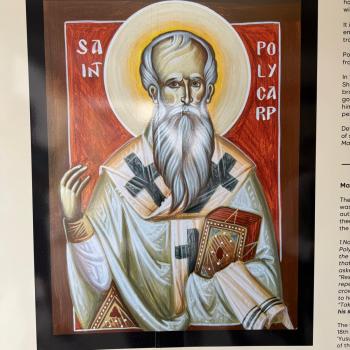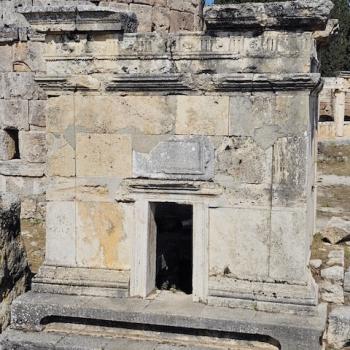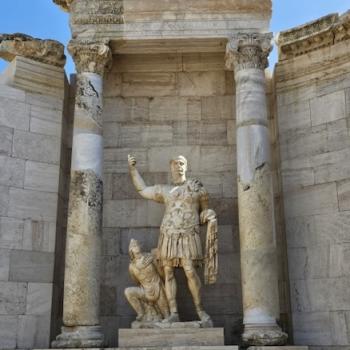BEN: I find p. 164 very confusing. You say “The fundamental mission of kingdom citizens is to glorify God by living the life of ‘good deeds’. God is most glorified when kingdom citizens live under King Jesus as a faithful community.”
This would seem to making doing good deeds and kingdom mission one and the same thing especially in the context of the salt and light verses. No?
SCOT: We glorify God by good deeds — that’s straight from Jesus. And part of kingdom mission is for kingdom people to do good deeds.
BEN: O.K. but previously you had made a strong distinction between good deeds and kingdom mission which is why I asked.Chapter 10 gets a big Amen from me.. especially the way it finishes.
Your book is like the wedding feast at Cana…. you saved the best for last. I really enjoyed Chapter 11… it raised two questions for me: 1) are you an annihiliationist when it comes to the lost, ala Mr. Fudge? and 2) did you ever read my Jesus, Paul and the End of the World? There was a lot of cross over between this chapter and things in that book.
SCOT: Way back in the late 90s when I wrote A New Vision for Israel I was intensely concerned with how to deal with the Naherwartung sayings of Jesus and read — very carefully — three monographs by Martin Kunzi and that work, along with constantly dealing with stuff Jimmy Dunn and Don Hagner were saying at the time, drove my concerns. I recall your book coming out after I had made up my mind; I had a copy on my shelves for awhile but the guts of my ideas were all composed in my work at TEDS for my teachings of Jesus class — I had detailed references I drew up in the late 80s and early 90s. But this book on kingdom is one in which I chose to cite very little bibliography.
BEN: I agree with you about the ambiguity of the evidence about eternal torment. We even have the phrase eternal destruction which sounds for all the world like an oxymoron to me (kinda like Microsoft Works). I’m certainly open to the end of afterlife suffering, but not sure that’s what the balance of the NT witness says. Edward Fudge has tried to enlist me for his cause, not successfully.
Well maybe someday you could look at my Jesus, Paul, and the End of the World. It’s still used a lot especially in the U.K., interestingly enough.
On to your appendixes, which leads to the question did you read Defending Constantine, the IVP book. It’s an excellent read and corrective to some of the wrong things people tend to say about Constantine.
SCOT: Yes, I read that book but I think you mean Leithart’s book and it’s not good enough for me on the realities of that brutal emperor, Constantine. Stephenson’s portrait is far better and my friend, George Kalantzis, at Wheaton — a classics and patristics scholar — a Baptist who grew up in Greece — and I agree on Leithart. He’s out to get Yoder instead of out to understand Constantine. For all his tendencies, Yoder was not far off on the implication of Constantine. I use that term, however, for an umbrella category that includes Erastianism and stronger forms, including the holy Roman empire. My ecclesiology is so central I want to call out compromising our surrender to Jesus as our king in the many ways the church has learned to do. I may not get total agreement on this stuff but I hope to cast a strong enough image for folks to see the major thrust. The second appendix is more nuanced.
The eschatology of Jesus does not seem to matter to many today. Wright seems to have knocked this one off the map. He — maybe the best term here is — historicized it all and seemed to have taken the steam out of many confident claims that Jesus got it all wrong.
BEN: What P.C. Doherty says about Constantine, and I think he’s right is that: 1) we should not judge Constantine by modern notions of what a Christian would be like. For example, a Christian in Constantine’s day might well believe in magic and sacred relics etc. He thinks Constantine did not favor Christianity just because he saw a rising tide and leaped onto the wave, he did so because he believed he had received divine guidance from the Son of God; 2) his mother was more devout clearly enough. 3) Constantine clearly had a strong sense of his previous sins, which is why he delayed his baptism until near the end of his life. He seems to have accepted the idea of ‘no forgiveness for post-baptismal sins’; 4) he had nothing to do with forming the canon, he let the bishops sort that out, but he did want the issue settled, and he certainly did make possible the making of copies of the Bible when things seem to have been settled. 5) he took away the status of ‘superstitio’ for the church, which allowed it to be seen as a legitimate religion. 6) as Emperor however, he continued to provide some support for existing pagan temples and priests, while favoring Christianity. 7) for the most part, he put an end to the persecution of orthodox Christians.
I am aware there is definitely another side to this whole story, but I think those things above can be demonstrated.
SCOT: More or less I would agree… but his warrior approach; his volatility with power and authority … his inner life … I don’t remember it all, Ben, but I don’t completely discount the advantageousness of conversion for the guy. Vision? Possibly … maybe probably. He was a military machine.
BEN: Honestly I would really blame the bishops who wanted Christianity to be a religion of priests, temples, and sacrifices like the pagan religions. They lusted to have influence in high places, and Constantine gave them the opportunity, especially under the influence of his mother. Constantine was also, like most ancients, a superstitious man. In other words, I think what we might call Constantinianism, the attempt to influence public policy and politics in order to Christianize the world, we should really blame the church leaders for!
BEN: O.K. Scot, nearing the finish line here. Questions about Appendix 1, though perhaps they will be somewhat addressed in Appendix 2? 1) should Christians run for public office?; 2) should Christians attend public schools; 3) should churches and church related institutions get tax exemptions?; 4) should Christians accept Social Security benefits? 5) should Christians participate in Obamacare?
I ask all these questions not least because the ‘let’s do everything in and through the local church model’ has singularly failed to be salt and light in our world to any sufficient degree. You say you are all for good deeds done in the public square by Christians, but what are the limits or nature of these deeds? Does it matter if Christians are good citizens and what should be the limits of their participation in civil society and politics? In other words, I think there are some pluses to the Anabaptist approach to some of these matters (particularly when it comes to pacifism) but not across the board. Not if it means letting the world go to hell in a handbasket while we just focus on what we are doing in our holy huddle.
SCOT:However one discerns God’s calling/vocation in their “good deeds”. That’s the short of it.
1. Carefully
2. Yes.
3. Probably not, I’m rethinking this one.
4. Yes, they paid taxes.
5. Yes, they paid taxes.
In and through the local church, first, as an embodiment that spills into public life.
BEN: This line,
“In and through the local church, first, as an embodiment that spills into public life”
is precisely what I would say for sure, but we seem to mean slightly different things by it, which I put down to a difference in ecclesiology.













